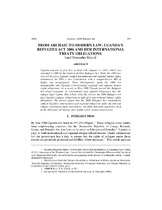From archaic to modern law: Uganda's Refugees Act 2006 and her international obligations
Abstract
Uganda enacted its first law to deal with refugees in 1955, which was
repealed in 1960 by the Control of Alien Refugees Act. While the 1960 law
was still in force, Uganda ratified international and regional human rights
instruments. In 1995 a new Constitution with a comprehensive Bill of
Rights was promulgated. These developments made the 1960 Act
incompatible with Uganda’s international, regional and national human
rights obligations. As a result, in May 2006 Uganda passed the Refugees
Act which integrates its international and regional obligations into the
refugee legal regime. This article critically reviews the 2006 Refugees Act
and Uganda’s refugee obligations in light of its international human rights
obligations. The article argues that the 2006 Refugees Act substantially
reflects Uganda’s international and regional obligations under the relevant
refugee and human rights instruments, but finds that some questions, such
as the definitions of ‘spouse’ and ‘public order’ remain unanswered.

